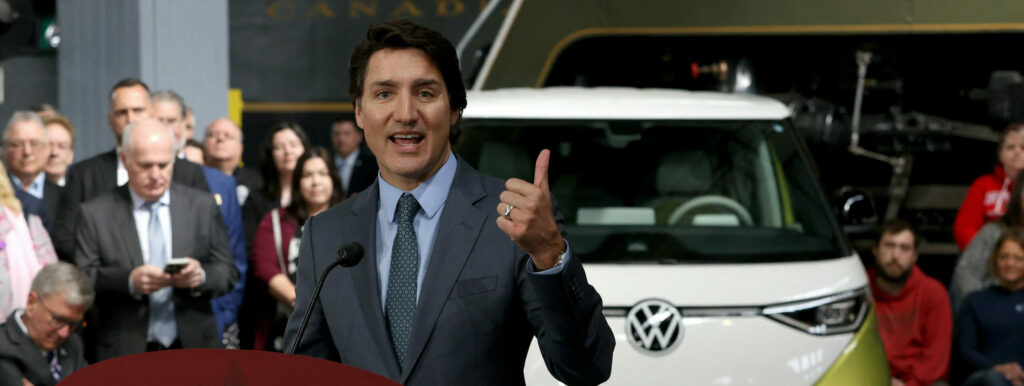Last week we discussed the problematic reality that the Canadian government actually has no idea where greenhouse gas emissions are coming from in the country or in what amounts, making its efforts to measure the impact of its various regulations and taxes futile. And it’s the same where you live behind the smooth verbiage. And now, CTV reports, “The economic cost of greenhouse gas emissions is nearly five times higher than previously thought, Environment Minister Steven Guilbeault said Wednesday.” What? Those complex models that justified, oh, say, a $13 billion subsidy for just one battery factory were complete hooey? On the plus side, conveniently, your anti-carbon policies can be one-fifth as effective as you claimed and suddenly it’s still worth it. (The recalibration came just as “Last year a federal analysis of regulations to reduce emissions produced from gasoline and diesel said the cost of that policy was about $151 per tonne” so way over the old guess and way under the new one. Phew.) On the downside, you were just making all that pseudo-scientific econometrics up. Along with the climate stuff.
Naturally the veneer of sophisticated mathematical knowledge remains unscratched:
“The minister told attendees at a climate change conference in Ottawa that the government used updated scientific knowledge and economic models to revise the way it evaluates how much climate change is costing Canadians.”
Well, not all the updated scientific knowledge, only the kind that lets them claim the SCC is higher than ever. And “scientific knowledge” is good, or would be if you had any, while “economic models” sounds better than “wild guesses”. But the timing is fishy:
“The new numbers have been in development for months but come after a recent report from the parliamentary budget officer on the economic costs of the carbon price.”
Just in time. Phew. But look at the way the numbers dance around:
“More than seven years ago an analysis estimated that by 2020 the [social] cost would be about $54 a tonne. Guilbeault said the updated model suggests that figure was actually closer to $247. He said this year it’s even higher, at $261 per tonne of emissions, and by 2030 it will rise to $294. ‘Pause for a moment to understand what this signifies,’ Guilbeault said.”
OK. [Pause.] It signifies that you had no idea what you were talking about then, and still don’t, since all you did was change one number in a kluged-together simulation that couldn’t predict April Fool’s Day on April 1. And yet the pseudo-precision flows on; Guilbeault said:
“Every tonne of carbon we reduce this year saves society as a whole $261 — and we are talking in terms of cutting megatonnes: millions of tonnes.”
Two hundred and sixty one. Which like fifty-four sounds like you calculated it precisely. Whereas if you said “Heck, about 250” or “Yeah, maybe 50 bucks” it would sound like a guess and you’d be busted.
Not by our famously hard-boiled skeptical journalists. The story peddles the figures that:
“Between 2005 – the year Canada uses as the base for its 2030 emissions targets – and 2021, Canada eliminated 62 million tonnes of greenhouse gas emissions. Using the new social cost of carbon figure, that equates to saving almost $10 billion.”
Under the old one, a measly $2 billion. Either way not enough to justify even a single battery plant subsidy, let alone all the other climate policies we paid for. But still, how do they know? How do they know what was emitted in 2005 and in 2021, and crucially what would have been emitted in 2021 if they’d done nothing?
Answer: They don’t. They need all three numbers, and don’t have any unless they make them up. Which they do. And if they don’t fit, multiply them by five. Which you might have to because in 2017 Canada’s Ecofiscal Commission, no band of grisly deniers “pegged the cost of Quebec’s electric vehicle subsidy at about $355 per tonne.” Better get the social cost of carbon up to that level. And it’s so easy. Just open the spreadsheet, change the cell value, hit “Recalculate” and send the minister out to burble.



The subject of Canada's rising CO2 emissions should bring up the touchy subject of immigration etc etc.. I recently read that all forms of inviting new people to Canada will result in excess of 800,000 permanent residents this year..
I will now state the required fact that I'm from a family of immigrants and am fine with sensible policies. I don't understand how adding a new Toronto every three or four years will be done without an awful lot of fossil fuel use. This of course raises house prices and we are witnessing hundreds of thousands of acres of farmlands and Wildlands being torn up for development. Green
Let's all be honest...this is all done in the name of importing (hopefully) Liberal voters, though to be fair all parties do so.
“ Every tonne of carbon we reduce this year saves society as a whole $261 “
And what is the cost to society if that tonne of Carbon was used to heat your kids school classroom, or was the fuel used to deliver milk to your local convenience store ?
“ Every tonne of carbon we reduce this year saves society as a whole $261 “
There is no correlation between these two values. Reducing a tonne of CO2 (different from a tonne of carbon) is a national value in control of Canada. $261 of social savings is based on a global change in climate that is impacted by global emissions that is out of the control of Canada. The lack of common sense and logic is scary.
The logical fallacy would be evident if an orchardist said “Every apple I pick costs a dollar, so every apple I DON’T pick saves society a dollar, and I deserve to collect tax from every apple that is eaten to compensate me for what I save society ” but somehow Guilbeault can get away with spouting such convoluted imaginings.
Completely made up numbers by Guillbeualt and co.Nobody believes it.